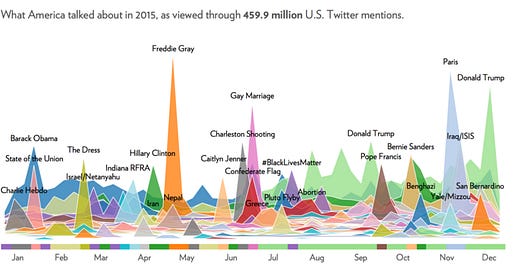GRANTED: Tips for Predicting the Future, Avoiding Conflict, and Sounding Smart
January 2016
Do you know what it takes to be original? The evidence might surprise you. I just launched this quiz—15 questions, 5 minutes. You can test your knowledge here.
Now let's kick off the year with some of my favorite recent articles:
1. How to Predict the Future
Time travel, obviously. Failing that, treat your beliefs as "hypotheses to be tested, not treasures to be guarded," says the experts in this Ana Swanson write-up.
2. The Secret to a Conflict-Proof Relationship
Time travel again! Okay, it's actually feeling understood by your partner. As Alex Fradera explains, even if you don’t agree, when one person feels understood, both parties are happier.
3. The False Promise of Meritocracy
Think you're acting fairly? Then watch out. Marianne Cooper shares a troubling finding: managers who think they're fair end up discriminating more against women and minorities.
4. The Science of Sounding Smart
Juliana Schroeder and Nicholas Epley discovered that job applicants think they sound better in writing than speaking, but the opposite is true. (Note to self: consider a spoken-word version of this newsletter?)
5. The Health Benefits of Volunteering
Just a few hours of giving a week can help keep up a healthy streak, but only if we keep that fact off our minds while we do it. If James Hamblin had his way, doctors would prescribe volunteering.
6. New Year's Resolutions Are Bad for You
Good news, I suppose, if you've already given yours up. Jessica Lamb-Shapiro recommends that you try setting smaller, concrete goals, and remember: January 17th is just as good a day to start achieving them as January 1st is.
7. The Four Topics that Dominated Twitter This Year

365 days, 460 million tweets, 140 characters at a time. A fascinating glimpse by Ana Swanson into what captured our attention this year.
From My Desk:
8. Why I Taught Myself to Procrastinate
I'll tell you... just, you know, not right now. When I get around to it. Maybe tomorrow.
9. Collaborative Overload
As people become known for being both capable and willing to help, they can also become overtaxed. Rob Cross, Reb Rebele, and I look at what happens when 20% to 35% of contributions come from only 3% to 5% of an organization's employees.
Cheers,
Adam

Adam Grant, Ph.D.
Wharton professor and author of GIVE AND TAKE and ORIGINALS



